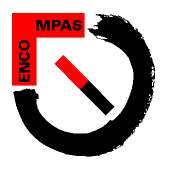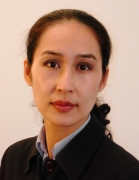

 Alexia
Petersen (B.A., M.A. Litt.) is Canadian and completed her studies at the
University of Toronto and Queen's University, Kingston. She has been living in
Aachen, Germany, and has worked in adult language education and intercultural
communication training for 15 years. Her very multi-cultural background
includes not only her native North America, but the German and diverse Asian
cultures. In addition to her native English, she speaks German, French and
Mandarin-Chinese. Both her teaching skills and background and experience,
which encompass three very culturally different regions, combine to make her a
uniquely qualified instructor.
Alexia
Petersen (B.A., M.A. Litt.) is Canadian and completed her studies at the
University of Toronto and Queen's University, Kingston. She has been living in
Aachen, Germany, and has worked in adult language education and intercultural
communication training for 15 years. Her very multi-cultural background
includes not only her native North America, but the German and diverse Asian
cultures. In addition to her native English, she speaks German, French and
Mandarin-Chinese. Both her teaching skills and background and experience,
which encompass three very culturally different regions, combine to make her a
uniquely qualified instructor. In her earlier experience as a trainer in adult language education and business English for companies she quickly noticed the instinctive transfer of learners' native communication patterns to the foreign language being learned and its impact on cross-cultural communication. While this phenomenon is frequently observed by language trainers, the impact of "cultural conditioning" is generally not a main focus of conventional language courses. Our seminars, therefore, take as their point of departure the premise that, while language skills are a necessary tool that facilitates cross-cultural communication, it is only one tool. The real focus in developing long-term, effective cross-cultural communication skills lies in all those other cultural factors which can cause miscommunication despite the presence of a common language, or even when technical language skills are "perfect".
This observation became the springboard for the development of an innovative conceptual framework to teach intercultural communication, which has been met with great success. The development of our seminar programmes draws of course from well-known concepts and models researched in the body of international literature on this subject. What distinguishes our approach, however, is that we have adapted and streamlined these into very useable tools and demonstrate their functionality, using both extensive practical examples collected over years from seminar participants, as well the insights we contribute from our own very multicultural backgrounds.
Alexia Petersen teaches workshops on intercultural communication at the RWTH
Aachen (Aachen University) and is frequently invited to teach at other
universities throughout Germany and abroad. Her seminars are also part of the
curriculum in the "Executive MBA for Technology Managers" Programme taught at
the RWTH Aachen and University of St. Gallen, Switzerland. In addition, she
writes on issues of intercultural communication and advanced English
communication skills training and is a regular contributor to magazines
(e.g. "Personal.Manager HR International" - the German-language trade journal
on international personnel management; "partners - Italy & Canada" - the
magazine of the Italian Chamber of Commerce of Toronto) and online
publications. She is also a member of SIETAR (Society for Intercultural
Education, Training and Research) and honorary member of the examination
committee for English at the Chamber of Industry and Commerce in Aachen.
 Stephan
Petersen (Dr.-Ing.) received his doctorate at the Research Centre Jülich
following his engineering studies at RWTH Aachen University. An engineer and
scientist, he is also a technical and marketing manager with a young company
that is active world-wide and based at the Technology Park of Herzogenrath
(TPH), Germany. In his daily work in an international environment he has
gathered over the years invaluable experience and insight into those aspects
and methods of intercultural communication that are prerequisite for
professional success.
Stephan
Petersen (Dr.-Ing.) received his doctorate at the Research Centre Jülich
following his engineering studies at RWTH Aachen University. An engineer and
scientist, he is also a technical and marketing manager with a young company
that is active world-wide and based at the Technology Park of Herzogenrath
(TPH), Germany. In his daily work in an international environment he has
gathered over the years invaluable experience and insight into those aspects
and methods of intercultural communication that are prerequisite for
professional success.
Through his work as an engineer in various functions with an RWTH
high-tech start-up, he contributes considerably to the application-
and practice-oriented approach of the seminars. As intercultural
communication skills are routinely required in his professional
workday, our seminar concepts are put to the test daily. This is the
guarantee that our conceptual approach is not only innovative and
convincing, but ultimately a functional tool for our seminar
participants and customers that has proven time and again to be
effective and applicable. His wide field of activities - all of which
involve different aspects of intercultural communication - include
product development (software) in international work teams; technical
management, product management, participation in international
research projects; seminar trainer and lecturer in Europe, North
America, Asia, and Africa; daily support contact and consulting for
customers around the world.
| Last changes to this page: 2006/09/13 |
Copyright © 1999-2019 A. & S. Petersen www.aspetersen.de |